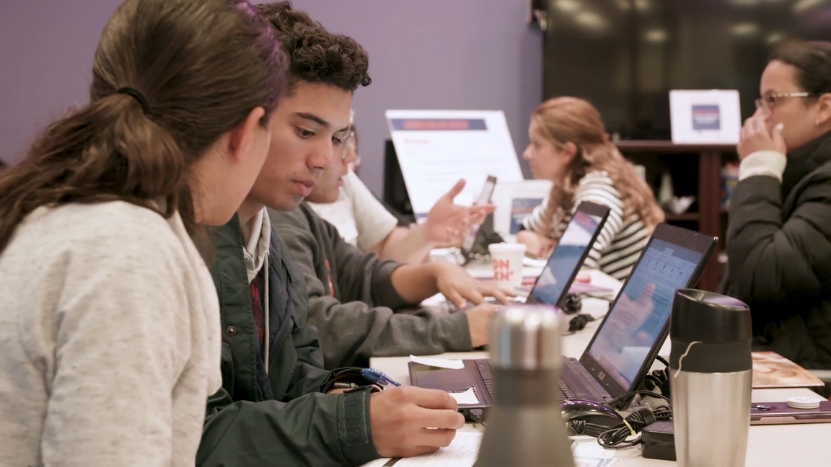
Share Post:
Plenty of non-native English speakers come to the United States filled with hopes and ambitions, ready to tackle big goals in higher education. Years of helping international students have shown how language gaps, cultural surprises, and finances can create a perfect storm of stress.
There is still enormous value in studying on American soil, yet countless learners find themselves wrestling with grammar guides, lecture notes, and the occasional baffling slang. The good news? Hurdles can be managed with the right strategies. Let’s go through them.
Table of Contents
Toggle1. Language Barriers in Academic Life

Academic reading frequently tops the list of exhausting tasks. A study published on PubMed Central noted that non-native English speakers can spend around 47% more time deciphering articles compared to native speakers.
That same research observed up to 91% more reading time for individuals with particularly low proficiency. In other words, a journal article that takes a native speaker two hours might consume three hours or more for someone still building fluency.
The strain extends beyond raw reading since many students must also comb through content more than once just to make sense of advanced terminology. One might hope that repetition eventually speeds things up.
However, data suggests the process remains time-consuming for an extended period, which drives many to seek specialized support:
The Writing Odyssey
Reports by Editage Insights reveal that non-native English speakers invest around 51% more time writing scholarly papers. Extra hours often go toward double-checking word choice, grammar, and tone, which can feel never-ending.
Research from PLOS Biology uncovered an even tougher reality: a tripled likelihood of paper rejection tied to language quality. On top of that, a writer with limited English skills is more than 12 times as likely to be asked for rewrites. No one signs up for that fun scenario, right?
Plenty of international PhD students mention devoting nearly 19 extra days per year to academic writing. That chunk of time gets even bigger with complex research projects.
Meanwhile, anxiety can spike around deadlines, prompting many to pay for proofreading or editing services, which not only adds costs but also creates a sense of dependence on third-party editors. A handful of supportive measures can lessen those burdens:
- Campus Writing Centers: Free or discounted one-on-one tutoring to improve grammar and structuring skills.
- Writing Workshops: Group sessions that tackle thesis statements, research outlines, and discipline-specific style.
- Peer Review Exchanges: Trading papers with fellow students to receive feedback on clarity and coherence.
If campus writing centers and workshops aren’t cutting it, check out risepte.com. It’s packed with practical tips, easy-to-use templates, and editing support that actually make sense for real academic struggles. Plus, if you’re gearing up for the PTE (Pearson Test of English), you’ll find plenty of resources to help you nail that too—no more stressing over every little grammar slip or awkward phrasing.
2. Communication Hiccups Beyond the Classroom

Everyday conversations can resemble an obstacle course. Native speakers throw around idioms and colloquialisms that seldom appear in ESL textbooks—think phrases like “hit the books” or “break a leg.”
Not only do such sayings cause confusion, they also spark that deer-in-headlights feeling when the dialogue moves at warp speed.
Pronunciation is another tricky aspect. Many learners note that speaking up in group discussions triggers anxiety since misunderstandings happen if the accent is strong or if the speed is too slow.
That same anxiety crops up at social events and can prevent individuals from forming close friendships. Some choose silence to avoid embarrassment, which unfortunately blocks opportunities to practice.
A few suggestions make day-to-day conversations smoother:
- Conversational Clubs: Groups focused on casual chats, with friendly corrections in real-time.
- Language Exchange: Swapping skills with a native English speaker who wants to learn your language.
- Media Immersion: Movies, TV series, and podcasts provide entertaining ways to catch new slang and practice listening skills at various speeds.
3. Cultural and Social Integration
Language barriers factor heavily into social isolation. When interactions are uncomfortable, it feels easier to retreat. Many non-native English speakers report feeling left out in the cafeteria or at group activities.
It’s not that local students lack empathy; it’s simply tough to bond with folks who can’t fully catch jokes or cultural references.
Adapting to American classroom customs can also create jitters. In many U.S. institutions, instructors expect students to speak up regularly. Someone from a culture that prizes quiet classroom behavior might need time to grow comfortable with spontaneous questions and debates.
Emotional Weight
Homesickness intensifies if day-to-day activities require constant mental effort. Anxiety can shoot up at the thought of group presentations or major papers. Self-esteem can take a beating, too, after repeated communication flubs.
Data showed that around 20% of non-native speakers confessed to high anxiety tied to writing, compared to 12% of native speakers. Another portion of respondents mentioned depression risks if isolation persisted.
A few ideas can lessen the emotional toll:
- International Clubs: A place to connect with fellow travelers who speak the same mother tongue or share a cultural background.
- Cultural Orientation Workshops: Sessions that offer insights into local customs, humor, and etiquette.
- Mental Health Counseling: Universities increasingly understand the need for support. Check the counseling center for group therapy tailored to language and cultural transitions.
4. Financial Strain
If I understand you well, you’re new to scholarship twitter, correct?
Let me show you how to prepare for your applications to the USA, Canada, Australia, UK, etc.
[This is probably a MUST READ thread for anyone who’s not sure of themselves.]First, any GPA you’ve got can get… https://t.co/rPOHLcHsfY
— Francis Ebuara (@ushiebuaras) March 15, 2025
Pursuing an education in the U.S. is already pricey, and adding more fees doesn’t help. Professional editing and tutoring services rarely come cheap, yet many non-native speakers rely on them.
That leads to an extra pinch on the wallet. Students occasionally try to trim expenses by splitting the costs with peers or applying for grants. However, not everyone discovers those options.
Some might feel tempted to skip editing altogether due to limited funds. Unfortunately, that often hurts academic performance in the long run, especially if an instructor or journal reviewer flags language mistakes. The cycle continues unless adequate support is in place.
Scholarships and Grants
Many institutions fail to promote scholarships geared toward international students who need help with language expenses.
A small irony: the system welcomes global tuition money, then overlooks assistance for those who could use an academic safety net. Proactive outreach from scholarship offices might change that. Interested learners can check for:
- Institutional Aid: Some colleges waive or reduce editing service fees for those with proven financial need.
- Departmental Funds: Research labs sometimes have budget lines for professional copyediting, especially if a paper is heading to a peer-reviewed journal.
- Private Grants: Organizations and charities occasionally sponsor ESL-related endeavors or academic writing assistance.
Strategies and Support for Success
@learnwithlucas I’m NOT A Native English Speakers #englishteacher #learnenglish #fyp #fypシ ♬ original sound – Learn English With Lucas – Lucas|English Speaking Teacher
1. Language Tutoring and Mentorship
Many universities offer peer mentoring networks where international students pair up with native speakers. A bit of conversation practice can do wonders for accent reduction and general fluency.
Students also benefit from an insider’s guide to campus life, which might include tips on class participation or deciphering cafeteria chat.
Other institutions run advanced English classes focused on discipline-specific writing. The trouble is that schedules often clash with lab work or other courses, making attendance difficult. Any sign of flexible class times or evening sessions would be a huge relief for busy students.
2. Inclusive Teaching Approaches
Professors and teaching assistants can reduce stress by speaking more slowly, using slides with clear bullet points, or allowing a brief pause after key questions.
Some educators encourage classmates to wait a few extra seconds before jumping in, which gives non-native speakers time to gather thoughts. Such minor adjustments can boost confidence and spark fuller engagement in classroom debates.
3. Community Building

Campus clubs and organizations help people mingle around shared interests, whether that’s volunteering, chess, or entrepreneurial ventures.
Language proficiency becomes less of a barrier when everyone is focused on a common hobby.
Summary
Stumbling over words or phrases isn’t the end of the world, though it sure can feel that way in a foreign country. Extra financial burdens, mental strain, and social hurdles can pile up, yet resourceful students find ways to adapt.
Universities, on their end, can expand access to language classes, editing support, and community programs.
Learners who push through language challenges gain a deeper appreciation for academic pursuits, personal resilience, and cross-cultural friendships. A pinch of awkwardness in conversation often comes with a side of personal growth that’s well worth the investment.
May each seminar, study group, and random coffee-shop chat pave the way for greater fluency and a more fulfilling experience abroad.
Related Posts:
- How AI Is Revolutionizing Education - Benefits & Challenges
- Top 10 Free Online IQ Tests You Can Take Right Now
- Best App to Read Books for Free - Top Recommendations
- Top 7 Hardest Degrees in the World - Are You Ready…
- Top 8 Hardest Languages to Learn - Toughest Ones to Master
- Top 12 Chrome Extensions for Nursing Students in 2025












